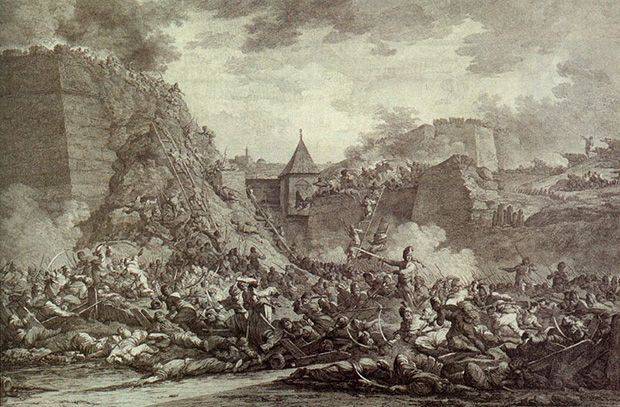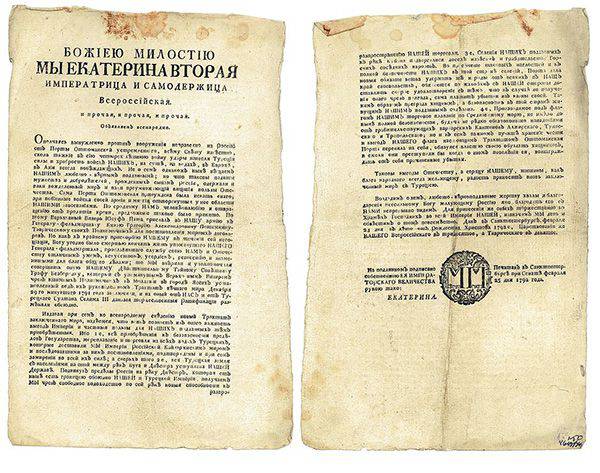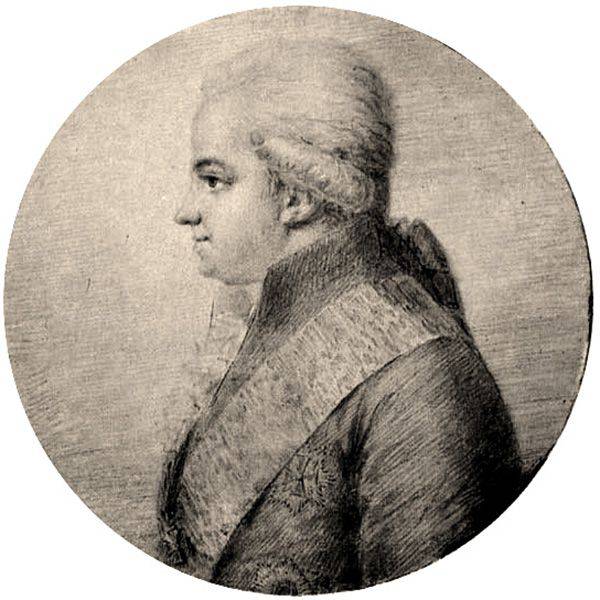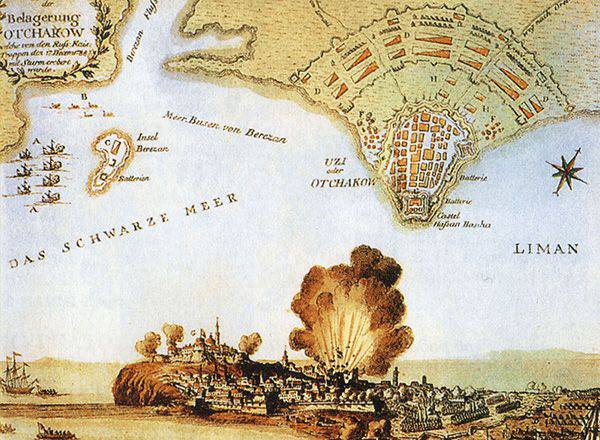Yassy world: how Crimea and Kuban finally became Russian

The last Russo-Turkish war of the eighteenth century demonstrated to the whole world the colossal capabilities of the army and fleet of Russia
The last days of December 1791 have become truly festive in Russia. And the reason for this was not only the recently passed Christmas of Christ and the coming New Year (which at that time did not celebrate too much), but the end of the next Russian-Turkish war. It was a weighty reason for joy: the confrontation of St. Petersburg and Istanbul, which lasted for four years, brought many glorious victories to the Russian arms, but obviously tired the country.
And another reason for joy, and after that for noisy celebrations, was the conclusion of 29 December 1791 of the year (9 January 1792 of the year in a new style) of the Yassy peace treaty. This document, which was officially called the Treatise of Eternal Peace and Friendship concluded between the Empire of All Russia and the Ottoman Port in Iasi on 29, December of 1791, was appointed to Russia not only by the long-awaited peace, but also by many benefits .

Between war and war
The Russian-Turkish war of 1787 – 1791, which became the second war with Turkey during the reign of Empress Catherine II the Great, although started on the initiative of Istanbul, was more advantageous to Russia. Under the terms of the Kyuchuk-Kainarji world, which crowned the first Catherine’s war with the Turks in 1768 – 1774, St. Petersburg received much more preferences than Istanbul would have liked. And during the short peace period that separated one war from another, Russia achieved even more. In particular, the Russian Empire 1783 annexed the Crimea and Kuban, thereby putting the final point in stories one of his oldest opponents - the Crimean Khanate. And the same year's famous Treaty of St. George, named after the place of signing — the fortress of St. George the Victorious, which was part of the Azov-Mozdok defensive line — led Eastern Georgia under the protectorate, which seriously weakened the Turkish influence in Transcaucasia.
But even the strengthening of Russian influence in the Caucasus and the expansion of Russia's military presence in the Black Sea could not satisfy the geopolitical aspirations of Empress Catherine and her cabinet. In the future, St. Petersburg saw the expansion of the boundaries of its influence, if not presence, on most of the former Byzantine lands.
However, all this was a distant prospect, and in near Russia it was necessary to strengthen its presence in the Northern Black Sea region as reliably as possible, and even better, to expand its borders slightly to the south and west. However, the recent Russian-Turkish war and tensions with European powers kept Catherine from escalating relations with Turkey. But Istanbul did not suffer from such complexes at all. Completely dissatisfied with the conditions of the Kyuchuk-Kaynardzhsky world and the subsequent actions of Russia, Porta sought only a pretext to start a new war, in the course of which she hoped to regain all positions lost earlier.
“Return Georgia and Crimea!”
That is why Istanbul made active attempts to loosen the hardly calming Crimean Tatars, who could not fully accept the loss of sovereignty. Since formally the Port, like other European powers, agreed with the treatise of the 1783 of the year, to which the whole of Tavrida, including Crimea, was finally annexed to Russia, the Turks could not act openly. But the idea to insist on sending their consuls to the Crimea, who would actually play the role of troublemakers, was Istanbul to their liking.
Similarly, Turkey acted in relation to the Kartli-Kakheti kingdom. Formally, the Ottoman Empire had no reason to dispute the Georgievsk Treaty, which established a protectorate of Russia over Eastern Georgia, and therefore preferred to act precisely. True, all attempts to persuade the Georgian tsar Heraclius II to change the Russian protectorate to Turkish ended in nothing. Then Istanbul made a bid for the neighbors of the Kartli-Kakhetian kingdom, constantly urging them to new and new raids on Georgian lands, hoping to cause the Georgians great anxiety and force them to look for a more reliable patron than St. Petersburg.
But Russia did not sleep. Until the end of 1786, it was limited to written claims to Porte, which regularly went to Istanbul and also regularly went unanswered. But in December of the same year, Catherine’s patience broke, and she instructed Ambassador to Constantinople Yakov Bulgakov to demand Porta not to violate the borders of Eastern Georgia. It is difficult to say how well the Russian empress imagined what kind of reaction this demand would cause in Constantinople. Most likely, quite well - and took the opportunity to push the port to exacerbate relations.

If everything was so, then the provocation was completely successful: having heard the demands of Russia from the mouth of Bulgakov, Constantinople was indignant. And some time later, put forward counter conditions. The Turks demanded that Russia give up Georgia and the right to have Turkish consuls in the Crimea, as well as reduce the duties for Turkish merchants to 3% and prohibit Russian merchants from exporting Turkish products. Istanbul insisted on an immediate response, but almost immediately, without even waiting for the reaction of St. Petersburg, expanded the demands, insisting now on the return of all of Crimea to Turkey.
When, in August, 1787, Yakov Bulgakov, on behalf of the Russian Empire, refused to meet these excessive claims, he was immediately arrested and imprisoned in the Seven Towers Castle. According to the diplomatic protocol, such actions were viewed as a declaration of war by Turkey, but the Port decided not to rely on questions of interpretations and 13 of August of 1787 declared Russia the war officially.
I must say that this decision was, as it was soon found out in Istanbul, untimely. Turkey was aware of the danger of bringing Russia and Austria closer to it, but did not expect that by the end of the summer of 1787, Moscow and Vienna would have time to conclude a military alliance and the war would have to be fought on two fronts. Only one thing calmed Constantinople: the diplomats from England, Prussia and France, who persistently pushed him into war with St. Petersburg, promised that the Russian army would also soon have to wage not one war, but two.
The European powers kept this promise, although not as soon as Turkey would like. Only in June, 1788, when Porta was already at war with Austria and suffered the first defeat of Russia, did the British persuade the Swedish king Gustav III to declare war on Russia: the Russian-Swedish war of 1788 – 1790 began. However, Istanbul’s calculations that the second front would divert substantial forces from the south did not materialize: the command of the Russian army managed to do with the troops that were already in the northern theater of operations, and the main hostilities unfolded in the Baltic Sea, which could not affect the situation. on the Black Sea.
Defeat after defeat, victory for victory
Although the campaign of the first two years of the war was unsuccessful for Austria as an ally of Russia, and the death of Austrian Emperor Joseph II in February 1790 and the succession of his successor Leopold II to the throne led to the conclusion of the Austro-Turkish world, in general, the course of military operations was an unpleasant surprise for Istanbul. In October 1787, on the Kinburn Spit, the five-thousand-strong Turkish troops were utterly defeated by one and a half thousand detachment of Alexander Suvorov. And this battle seemed to anticipate the whole further course of the fighting, condemning Turkey to defeat.
In July 1788, the Sevastopol squadron, along with other forces of the Black Sea Fleet under the command of Marko Voinovich and Fyodor Ushakov, defeated the Turkish squadron at Fidonisi. In September 1788 of the year, troops under the command of General Ivan Saltykov took the Khotin fortress, and in December 1788 of the year Potemkin stormed Ochakov, revered by the Turks of one of their strongest fortresses.

The next year, 1789, brought new defeats to the Turks. Three times they failed in the battles with the troops of Peter: April 7 - in Barlad, April 10 - in Maximini and April 20 - in Galati. July 21 and September 11 of the same year, two legendary victories - under Focsani and Rymnik - were won by the general-general Alexander Suvorov. In addition, in the same year, the Turks lost such important strongholds as Haji Bey, Akkerman and Bender.
The 1790 campaign of the year has become even more unfortunate for the Turkish troops. The Russian army managed to take Kiliya and Tulchu by siege or storming, and at the end of December Izmail, a miraculous fortress quietly surviving a yearlong siege, after only five days of preparation was a decisive assault taken by the troops under the command of Alexander Suvorov. A little earlier, the Turks were defeated in the Caucasus, where General Ivan Herman defeated the Turkish corps of Batal Pasha, and in the Black Sea, where the Russian fleet took over the Turkish in the battles in the Kerch Strait and at Tendra.
The final point in the confrontation was put by the 1791 campaign of the year, after which it became quite obvious: the Port no longer has the strength or ability to wage war with Russia. June 3 troops of General Ivan Gudovich captured Anapa - one of the most powerful Turkish fortresses on Taman, a little less than a month later the army under the command of Nikolai Repnin defeated Macha’s group of Ottomans, and on July 31 the Russian fleet, commanded by the already legendary naval commander Admiral Ushakov, smashed the Turkish fleet fleet at Kaliakria.
The blows and defeats were so strong that Istanbul began to look for ways to reconciliation. The prerequisites for peace were signed at the beginning of July 1791 in Galati, and three months later the main negotiations began in the city of Iasi - the capital of the Moldavian principality.
What gave Russia Yassky world
The Russian side at discussions of the Yassky world was originally represented by the Most High Prince Grigory Potemkin - a man who enjoyed the unlimited confidence of Catherine the Great and possessed almost unlimited power. But he died soon after the start of negotiations, and the leadership of the Russian delegation was shifted to Count Alexander Bezborodko, the de facto leader and foreign policy guide of the Russian Empire from 1781.
It was Bezborodko who insisted that the Russian delegation would under no circumstances soften its position. The reason for such rigidity were the reports of Russian agents in Istanbul, who reported that the Turkish negotiators had been ordered to attain the conclusion of peace by an unofficial order of the Sultan. Therefore, Bezborodko shamelessly put forward the toughest conditions, and if the Turkish side tried to stubbornly, threatened to interrupt the truce and resume hostilities.
These threats proved to be effective: Turkey, which, after a series of military setbacks, ceased to support the former allies - both London and Berlin, and Paris, seized by the revolution - agreed to significant concessions. First of all, the Yassy peace treaty fully restored the effect and conditions of the Kyuchuk-Kanarji world, and also confirmed the transition to Russia of the Kuban and Crimea. The Georgian issue was also resolved: under the Treaty of Iasi, the Turks renounced claims to Georgia, pledged not to take hostile actions against it and to keep the Caucasian nationalities under its control from raiding the Russian lands. But there were new acquisitions: for example, the land between Russia and the Southern Bug and the Dniester was ceded to Russia, and this made the entire Northern Black Sea region Russian. The old borders were also confirmed - along the Kuban River in the Caucasus, and new ones were identified - along the Dniester in Moldova. It was on these new lands that a new city soon appeared - Odessa, the founder of which was Osip de Ribas, one of the heroes of the war ending who participated in the Yaski negotiations.
Of course, Yassky Peace did not bring the Russian crown of the results that it dreamed of in the long run. But even without this, it became one of the most important events in the Russian history of the 18th century, expanding Russian territory and having a significant impact on Russia's position in the international arena. And most importantly, the Yassky peace, like the war that preceded it, demonstrated to the whole world the resilience and combat capabilities of the Russian army and navy.
Information